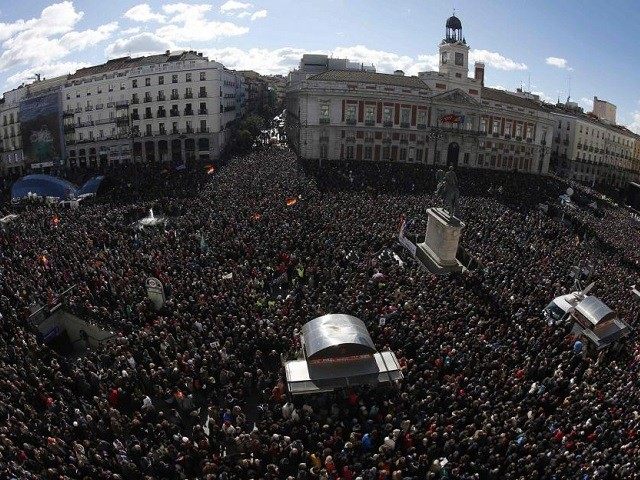Greece’s new anti-austerity Prime Minister Alexis Tsipris has a strengthening ally in Spain as divisions firmly appear amongst eurozone members.
German Chancellor Angela Merkel has ruled out cancelling any of Greece’s debt, saying banks and creditors have already made substantial cuts on the same day as tens of thousands of people take to the Madrid streets in support of the anti-austerity Podemos party, the Guardian reports.
260 buses are expected to bring supporters to the capital from across Spain as Podemos formally launches its election campaign, the party said on Friday.
Its leader, Pablo Iglesias, said in December “This is not about asking for anything from the government or protesting. It’s to say that in 2015 there will be a government of the people.”
“We want a historic mobilisation. We want people to be able to tell their children and grandchildren: ‘I was at the march on 31 January that launched a new era of political change in Spain.’”
The rally will take place at the end of the march in Madrid’s Puerta del Sol square where thousands of people gathered in 2011 to demand change.
Meanwhile Mrs Merkel told Die Welt that she still wanted Greece to stay in the eurozone and EU economic and financial affairs commissioner Pierre Moscovici told the BBC’s Hardtalk that Greece had to honour its debts, although he wanted to keep it in the single currency.
But with Finance Minister Yanis Varoufakis already rolling back the austerity measures and refusing to work with the organisations overseeing Greece’s debt the situation, known as the ‘troika’, reaching a compromise is looking increasingly difficult.
Syriza swept to power on a promise of writing of half of Greece’s debts taken on when the European Commission, European Central Bank and International Monetary Fund – had agreed a €240bn bailout with the previous Greek government.
Mrs Merkel told a Hamberg evening paper, “I do not envisage fresh debt cancellation.”
“There has already been voluntary debt forgiveness by private creditors, banks have already slashed billions from Greece’s debt.”
Greece still has a debt of €315bn – about 175% of gross domestic product.
On Friday, the Spanish authorities released positive statistics about the economy, saying that during the last quarter of 2014 it had grown at its fastest pace in seven years, backing the Prime Minister’s claims that “2015 will be the year that the Spanish economy takes off.”
But the trickle down effect has not reached those voters Podemos have captured the imagination of. With 5.4 million people still unemployed, 700,000 households devoid of someone on a permanent work contract and many salaries having dropped, things are looking bleak for Spanish voters. And Prime Minister Rajoy has to explain why, if 2014 was the ‘year of recovery’ as he said, did the courts give the green light to more than 21,000 home evictions?
Syriza will be a trail blazer for the Spanish anti-austerity party, proving that renegotiation and anti austerity measures are possible. But at the same time, its fortunes will be inextricably linked to that of Greece’s new government.
This is why the Spanish government has urged European leaders and the troika to take a hard line on Athens, knowing that any concessions will give fuel to the fire of Podemos and discrediting the argument that austerity was the only option.
A member of the governing party told Spanish radio “In Brussels, everybody is clear that debt forgiveness is not possible, that Greece’s debts cannot be forgiven and that they’ll have to live up to their obligations in some way or another.”

COMMENTS
Please let us know if you're having issues with commenting.